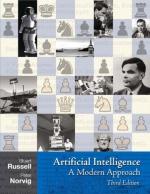|
This section contains 2,074 words (approx. 7 pages at 300 words per page) |

|
Because logic underlies all deductive reasoning, one might say that all computers are logic machines. In a wider sense, any mechanical device is a logic machine (for example, an eggbeater spins clockwise "if and only if" its crank turns clockwise). Generally, however, the term is restricted to machines designed primarily or exclusively for solving problems in formal logic. Although a digital computer, or even a punch-card data-processing machine, can be programmed to handle many types of logic, it is not considered a logic machine in the strict sense.
The rotating circles of Ramón Lull, thirteenth-century Spanish mystic, cannot be called logic machines even though they were used as reasoning aids. The first true logic machine was a small device called a "demonstrator," invented by Charles Stanhope, third Earl Stanhope, an eighteenth-century English statesman. By sliding two panels (one of gray wood, the other of transparent...
|
This section contains 2,074 words (approx. 7 pages at 300 words per page) |

|


